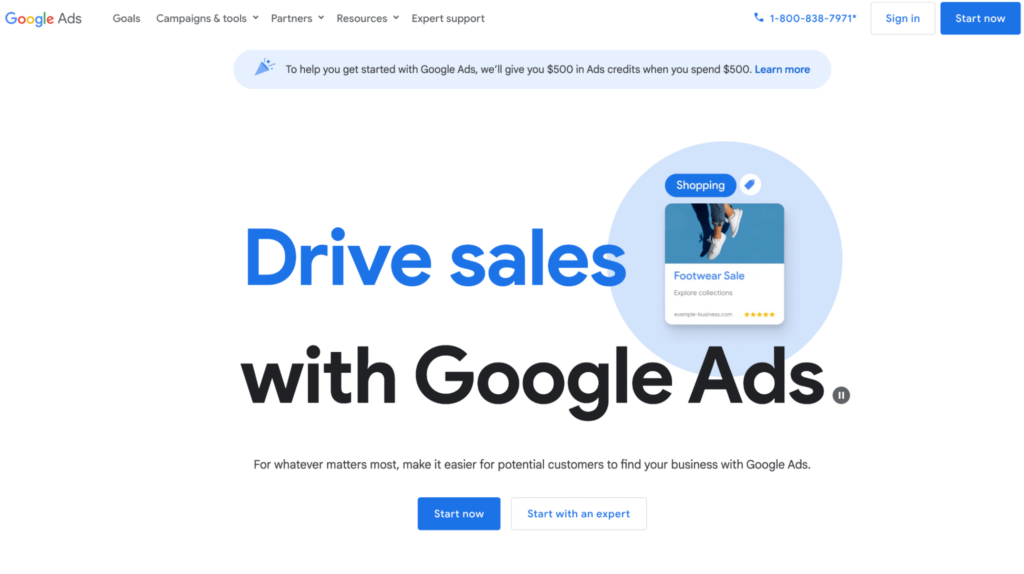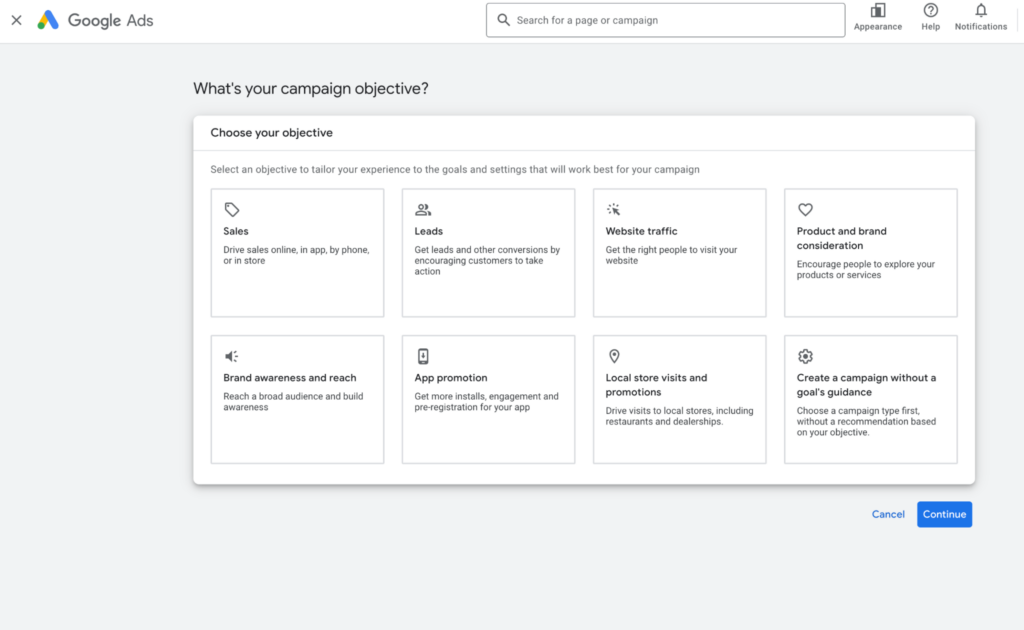When you want to attract new clients to your counseling service, Google Ads can help. With the ads, people who search Google using specific keywords will find your practice at the top of the results. It can lead to more traffic to your website and increased appointments.
While dozens of digital marketing options are available, few have the same immediate impact as paid search ads. Ads can help you immediately connect with people seeking help from a qualified mental health professional. Other options, like commercials and social media, don’t provide a direct link to people who need your services. You may use valuable resources on them while failing to reach new customers.
This post explains Google Ads for therapists and counselors. You’ll learn about how they work and their benefits. You’ll also learn some strategies for making the most of your campaigns.
What are Google Ads?
Google Ads are a form of paid search advertising that appears at the top of search results. You pay to display a brief advertisement for your mental health practice. Then, you pay a fee each time someone clicks on the ad. This strategy is called pay-per-click (PPC).
Google offers different types of advertising, including:
- Search Ads – These ads appear on search results. To get one, you bid on keywords, like “counseling in Oklahoma City.” Then, when a user searches for that phrase, your ad appears in the search results. If they click on the ad, then you pay.
- Display Ads – These visual ads appear on Google’s Display Network, including partner websites like YouTube. While display ads can be on a PPC model, they can also be on a cost-per-impression (CPM) basis, which means you pay based on the number of times your ad is displayed, regardless of whether anyone clicks on it.
- Shopping Ads – These appear in Google Shopping results and showcase products directly. They operate on a PPC basis.
- Video Ads – These ads are mostly on YouTube and can be billed in various ways, including cost-per-view (CPV), which charges you when someone watches the ad for a certain amount of time.
Paid Ads vs. Organic SEO
Search engine optimization (SEO) involves improving your website and creating content to rank higher in search results for your chosen keywords.
Organic SEO traffic offers several key benefits to be aware of. For one, it’s long-lasting. If you devote the time and effort to your SEO strategies, you’ll find that you continually rank for your targeted keywords for years to come. If you stick to your SEO efforts, the results compound.
You can succeed at SEO for free if you’re on a tight budget. You’ll just need to devote time to learning how SEO works and creating content. If you don’t mind putting time into your SEO activities, you’ll save money in the long run.
You can also consider working with a marketing company that specializes in SEO. You’ll spend some money, but you’ll save time. You’ll also work with experienced people who can optimize your site for search engines. As such, you won’t need to undergo trial and error.
SEO isn’t a perfect solution, however. Results can take time. You may need to use other efforts to attract clients during that time. Google Ads also have pros and cons. The obvious benefit is attracting clients quickly. You won’t need to wait months for your website to appear before potential clients. Instead, they’ll instantly see your business whenever they search using your targeted keywords.
Furthermore, you can build a robust client base entirely through ads if you have the financial resources. Simply fund your advertising activities until you obtain your desired number of clients. Then, you can stop spending until you need more customers. As you learn more about how your audience responds to your ads, you can tweak them to become more effective and potentially reduce advertising costs.
There are two primary downsides to online advertising. The first is the cost. You’ll pay money every time someone clicks on your ad, and that click may not always result in a new customer. Sometimes, people accidentally click on ads, resulting in an unnecessary expense. Others may have a genuine interest in your counseling services but find that they aren’t suitable for their needs.
The cost of running online ads can be pretty high, especially if you pay for competitive keywords. Some cost between $5 and $10 a click, and others cost even more. You’ll want to conduct appropriate research to find valuable keywords that result in the most conversions for your counseling service. Google can help you, but you may also need to undergo some trial and error.
Another disadvantage of these ads is their short-term nature. Once you stop running them, you’ll no longer appear in the top search results unless you get there through SEO. The results from online ads don’t compound, so you’ll need to rely on other advertising methods to attract future clients if you need to.
With all of this being said, combine Google Ads with SEO in the early stages of your service. You’ll attract the clients you need to grow your business through the ads while setting your practice up for the benefits of SEO.
When Should You Use Google Ads?
This type of advertising offers a lot of benefits. Specifically, it can help you create awareness of your mental health practice and lead more people to your website. But other benefits can guide you in deciding when or if this approach will be effective for your practice.
When You Want Almost Instant Results
Google Ads will almost instantly send more traffic to your website. Then, if your site offers the information people are seeking, they’re likely to take the next step of booking a call or appointment. So, with this type of advertising, you get almost instant results. Those results continue as long as you keep paying.
When You Seek Highly Targeted Leads
Google doesn’t send just anyone to your website. The people it targets for your advertising are searching for services like the ones you offer. That means you’re more likely to be able to convert them into clients.
When You Need Flexibility
Google offers a lot of customization, from the people your ad is targeting to the type of ad format you want. This flexibility makes it an ideal advertising platform because you can reach who you want, how you want, and where you know they’re already gathering to seek out information.
When You Aren’t as Well Known
Maybe you’re new to this market, a certain specialization, or just aren’t as well known as your competitors. None of this matters when it comes to these ads. The playing field levels when you pay for advertising geared toward specific audiences.
When You Want to be Smart About Your Spend
Here’s the thing… advertising isn’t cheap. People in the healthcare industry spend $500 to $3,000 a month on average on Google Ads. The great news is that you can control how much you’re willing to pay each month. You also can stop paying when your schedule fills up. You’ll just want to be clear on your advertising goals and budget and work to accomplish them strategically.
When You Need a Seasonal or Time-Sensitive Approach
You’ll want to consider your current clients and when they need your services to identify seasonal or time-sensitive opportunities. While you may associate seasonality with retail or hospitality verticals, seasonality can also apply to counseling.
For instance, those with Seasonal Affective Disorder typically notice increased depressive symptoms during fall and winter. If you help people like them, you might run specific ads during the latter half of the year.
How to Set Up a Google Ads Account
You can create an account in just a few steps that take less than an hour to run through.

To start the process, create a Google Ads account. You must provide your business name and website, as well as a goal for your campaign. Examples of campaign goals include garnering phone calls, filling out a lead contact form, and making sales.

Additionally, you’ll need to provide Google with your billing information to finalize your account. Select your country and time zone, then provide a valid debit or credit card number. If you prefer not to use a card, you can also make payments via PayPal or straight from your bank account.
Next, you’ll set a budget. Start small if you’re entirely new to using these ads. That way, you can learn how the service works before spending too much money.
Google will ask you whether you want to connect your Google Ads account with any other services they offer. Google Analytics, for instance, allows you to monitor visits to your website. Google Analytics also provides helpful information you can use to tweak your ads in the future if you like. You can set up a Google Analytics account if you don’t already have one.
How to Run Your First Ad Campaign
After you create your account, you’re ready to run your first campaign. Here are some valuable tips regarding how to succeed in doing so.
Defining Campaign Objectives and Key Performance Indicators
As mentioned above, Google Ads will ask you to define a goal for your campaign, such as increasing client leads. Doing so helps Google determine which keywords are suitable for your ads. You’ll receive suggestions based on the type of counseling services you offer, your budget, and your location.
From there, you can begin creating your ad. You’ll need to draft the ad’s wording, which should include a call to action that encourages people to contact you to schedule an appointment. You should also include a link to your website that people can visit to learn more about your services. You can include additional items to help your ad stand out, such as graphics, videos, and phone numbers.
A good practice is to set up key performance indicators to measure the results of your campaign. A few to consider include website visits, costs-per-click, and conversion rates. You can also set a few benchmarks to evaluate your campaign and compare them over time to determine whether further adjustments are needed.
Selecting Target Keywords for Therapists’ Ad Campaigns
It’s likely you already have a few keyword ideas in mind for your ad campaign. For instance, if you offer couples counseling in Austin, Texas, a keyword combination like ‘couples counseling in Austin, Texas’ might work. Other keywords, like ‘divorce counseling Austin’ or ‘relationship counseling Austin’ may also be effective.
In any case, Google will provide you with suggested keyword options to consider based on the services you offer. You can use those or create new variations based on your own research.
Creating Compelling Ad Copy and Extensions
Your ad must give people a reason to contact you and schedule an appointment. If it doesn’t, you’re unlikely to see the results you’re looking for from your campaign.
If you’re unsure what to write, think about what attracts clients to you. Are you a good listener? Do you have an eye for solutions to complex life problems? Those are both attributes that clients will want in a counselor, so consider including them in your ad copy.
You can add additional extensions to your ad, like a video testimonial, that can help convince people to schedule an appointment with you.
Common PPC Mistakes to Avoid
Counselors should look out for the following pitfalls to avoid in their online advertising campaigns.
Budgeting Mistakes and Setting Realistic Expectations
PPC ads can be rather expensive, especially if you spend on costly keywords that only result in a few clicks. You’ll have a few options for determining how much you want to pay, including setting a maximum amount per click and the total you wish to pay over a specific period.
Remember, every click on an ad will cost you money. Multiple people will likely click before anyone schedules an appointment. Determine how much money you’re willing to pay for every new client you acquire, and try to keep your budget aligned with that number.
Poor Keyword Research and Targeting Strategies
Carefully define your target audience and their needs before paying for any ads. If you don’t appropriately identify your audience, you’ll likely find that the quality of your leads suffers. You may get clicks, but they may not be from people who convert or need your services.
A few factors to consider in the targeting process include your location and the type of counseling services you offer. You can use Google’s keyword suggestions, but you’ll likely want to do your own research too. Consider using a tool like Semrush, which can tell you which keywords your competitors use to rank with search engines.
Ineffective Ad Copy and Landing Page Alignment
Another common mistake counselors sometimes make is failing to connect their ad copy with their landing page. A landing page is what visitors first see when they click on your ad. Yours should be highly specific to your ad copy to ensure visitors don’t spend additional time navigating through your website to find what they need.
For instance, if you’re running a Google Ad for substance use counseling services, you won’t want to link to your website’s homepage. Instead, create a page that describes your services and allows clients to call you or schedule an appointment. Visitors shouldn’t need to take additional steps to connect with you.
Building Your Client Base
Whether you’re opening a new counseling practice or trying to attract clients to your existing business, there’s no denying that Google Ads can help you reach your goals. Create an account and decide on your campaign objectives to get started. You’ll need to perform keyword research and write compelling copy to encourage viewers to take further action with you.
Make sure you don’t fall prey to overspending. Define your advertising budget, and stick to your numbers. Aim for less expensive keywords to minimize costs and avoid costly clicks that don’t convert. With a carefully balanced strategy, you’ll see results.
If you are looking for an easy way to build your counseling client base, consider claiming your profile in All Counseling’s therapist directory. It helps people seeking counseling find you.

